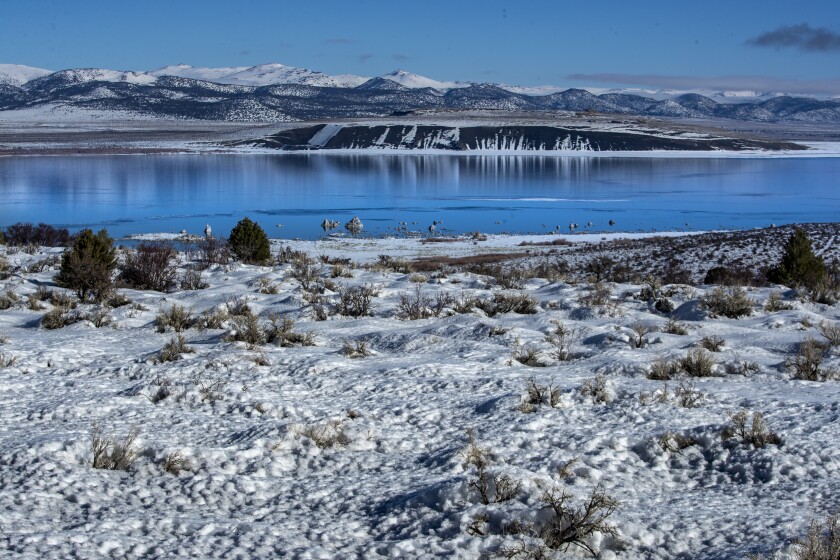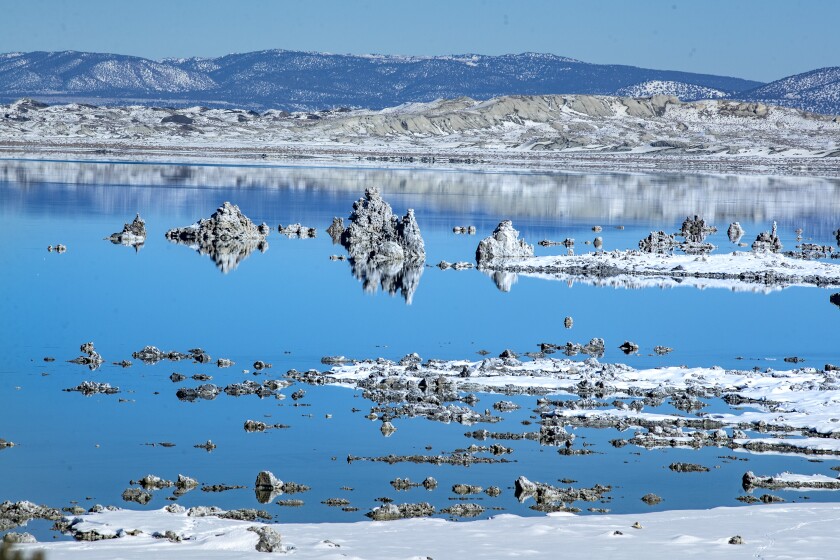[ad_1]
They were expert hunters, gatherers and basket weavers who lived for thousands of years on a trade route over the Sierra Nevada range connecting them with the rest of California.
The modern history of the Mono Lake Kutzadika Paiute people is told mostly through economic hardship, displacement and a 150-year fight for federal recognition as a distinct Native American tribe — a step needed to establish a sovereign land base to call home.
Rep. Jay Obernolte (R-Big Bear Lake) on Saturday ventured into their lunar-like ancestral landscape of bizarre craggy formations, dormant volcanoes and jagged peaks and delivered good news during an emotional meeting with leaders of the tribe whose members have dwindled from 4,000 to 83.
Obernolte said he plans to introduce a bill on Tuesday asking Congress to extend federal recognition to the tribe.
“This is exciting — I’ve been fighting hard for recognition for 20 years,” Charlotte Lange, 67, chairwoman of the tribe, said at the start of their first face-to-face meeting.
“We’ve got a long way to go and we’re going to need all the help we can get,” Obernolte said. “Once we get a hearing scheduled on this matter, your testimony is going to be critical.”
“That’s because,” he added with a smile, “it’s hard to say ‘no’ to someone in person.”

View of Black Point on the north shore of Mono Lake.
(Brian van der Brug / Los Angeles Times)
The meeting was held at a community center in Lee Vining, a small town along U.S. 395 known as an eastern gateway to Yosemite, overlooking one of California’s most famous natural vistas. It came three months after an article about the tribe’s plight appeared in The Times.
At the heart of the matter is the fact that the tribe, like their kin everywhere, was here first, and they did not consider their way of life to be the expendable price of living in America.
Yet their culture was obliterated by invasions of gold miners, cattle ranchers and boomtowns in the 1860s that forced them out of their homeland.
The tribe takes its name from its traditional word for what was once a high-protein food source, the pupae of tiny black alkaline flies that carpet the Mono Lake shoreline.
It is already regarded as an influential political entity by local government; the U.S. Forest Service, which has set aside a grove of trees for traditional purposes; and the National Park Service, which permits tribal members to enter Yosemite National Park at no cost.
But tribal members both young and old worry they won’t live long enough to see the tribe attain federal recognition.
A federally recognized tribe has sovereignty, does not pay taxes, and is exempt from following state or county legal ordinances. It is entitled to full service from local law enforcement authorities and fire departments, hospitals, and road and flood control systems.
It is also eligible for federal assistance from legal programs created to help reclaim lands lost over the decades through tax sales, fraud, and violence, and with healthcare, education and protection of sacred sites.

Snowy tufa towers at Mono Lake in February.
(Brian van der Brug / Los Angeles Times)
The Mono Lake Paiute are among roughly two dozen unrecognized and landless tribes in California that have already initiated petitions for federal recognition by the Department of Interior’s Bureau of Indian Affairs.
But few of those efforts are likely to succeed, experts say, because they usually cost hundreds of thousands of dollars, require extensive documentation and research by anthropologists, historians and tribal members and can take a decade or more.
Obernolte, as vice-ranking member of the House Natural Resources Subcommittee for Indigenous Peoples, resubmitted a bill first introduced in September by then-Rep. Paul Cook (R-Yucca Valley) to bypass the petition process by having Congress extend the federal recognition status.
The subcommittee is chaired by Rep. Teresa Leger Fernandez (D-New Mexico), an attorney specializing in tribal advocacy.
But the tribe’s struggle is far from over. To become a law the bill must be approved by both the U.S. House of Representatives and the U.S. Senate and requires the president’s approval.
The Mono Lake tribe is supported by more than a dozen other recognized tribes throughout the Sierra Nevada.
“This bill is a good start,” said Kathy Bancroft, tribal historic preservation officer of the Lone Pine Paiute Shoshone Tribe. “What it really needs now is bipartisan support in Congress.”
The tribe is also backed by the Mono Lake Committee, a 41-year-old nonprofit group organized to save and protect the bowl-shaped Mono Lake ecosystem that is half the size of Rhode Island.
“The Kutzadika were the first voices of the Mono Basin, and they are still very much here,” said Geoffrey McQuilken, executive director of the committee. “Their wisdom is essential to creating a sustainable future for this very special part of California.”
“We hope this recognition bill advances through Congress quickly,” he said.
Tribal members hold out hope of establishing a federally protected homeland in the vicinity of Lee Vining, perhaps on public lands currently overseen by the U.S. Bureau of Land Management.
Then there are 800 acres of nearby forested Mono County property that Mono County Supervisor Bob Gardener, a tribal supporter, said, “We’d be happy to offer for a dollar.”
Larissa Cortez, 15, had a final word for the congressman as he was preparing to leave.
“I’ve been here all my life,” said Cortez, who was dressed in traditional Paiute attire including beadwork and leather moccasins, “and I want you to know that federal recognition is very important for this land and its first people.”
Obernolte wouldn’t argue with any of that.
“What do you want to do when you graduate from high school?” he asked.
“I’m going to be a lawyer,” she said, “specializing in tribal affairs.”
[ad_2]
Source link